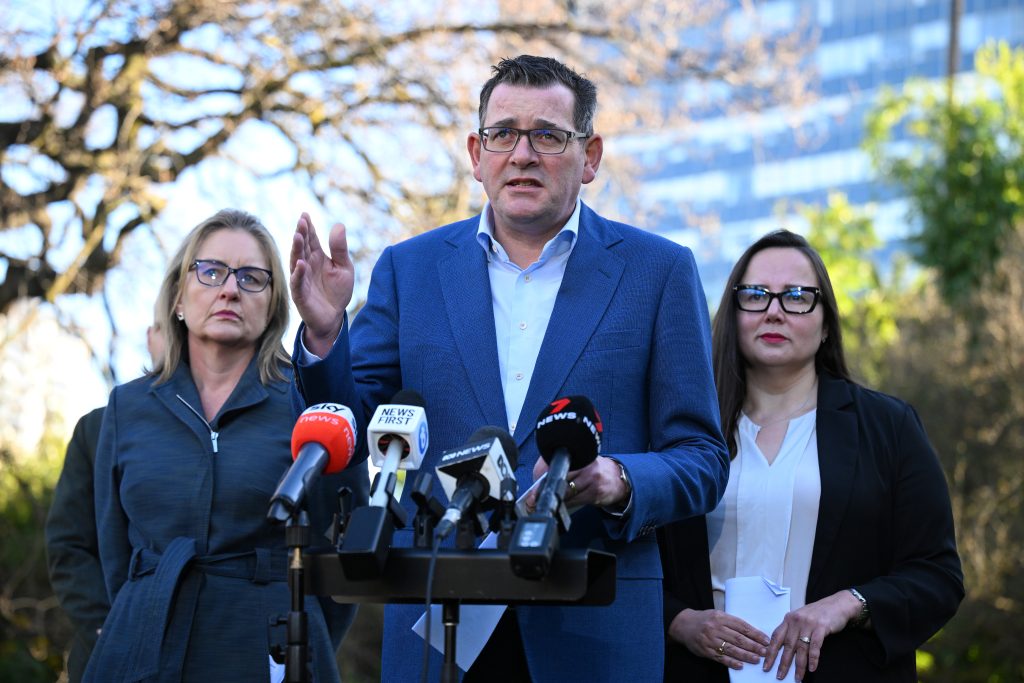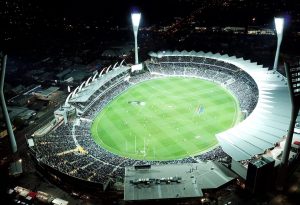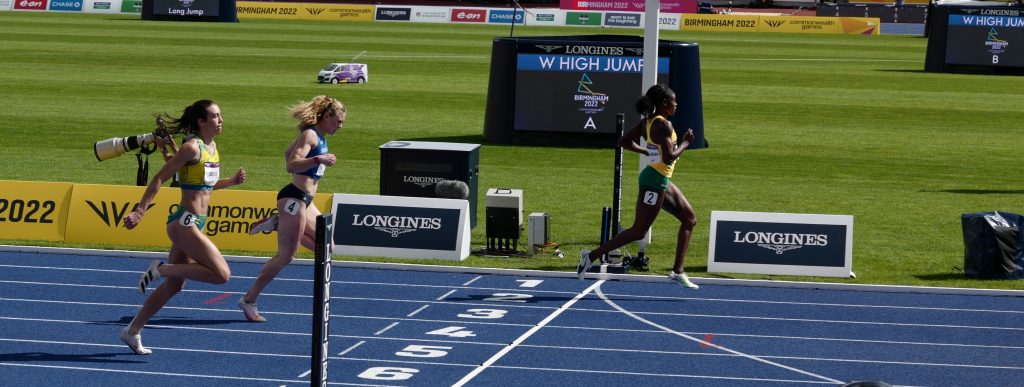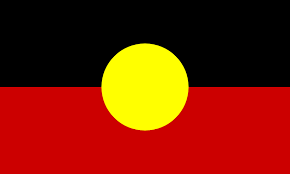 Written by Gordon Hunter Meredith
Written by Gordon Hunter Meredith
Innes Fitzgerald burst onto the international running scene with a fourth-place finish at the 2022 European U20 Cross Country Championships as a 16-year-old.
She then made headlines when she declined her spot on the UK World Cross Country team citing that the flight to Bathurst in regional New South Wales would “explode her carbon footprint.”
Given that Fitzgerald is the first female UK 16-year-old to break 9 minutes in the 3000m, she would have likely been faced with another torturous decision; represent her country for the first time at another major global championship in regional Australia – the 2026 Commonwealth Games in Ballarat – or decline the spot due to travel concerns.
Now, however, there is no choice. The Games are gone.

Victorian Premier Daniel Andrews press conference announcing the cancellation of the 2026 Commonwealth Games Credit – AAP Image/James Ross
15 months after agreeing to an innovative structure that would see the 2026 Commonwealth Games hosted across five regional cities, the Victorian Government declined its commitment to the sporting event following a similar logic to Fitzgerald’s – that any benefits achieved by executing such a resource-intensive operation would be outweighed by the costs.
Typically, the ensuing commentary has been focused on finger pointing and “gotcha” moments that may or may not have electoral ramifications for the Labor Party and for current Premier Dan Andrews, as well as the evergreen discussion about the Commonwealth Games’ place on the global sporting calendar.
Analysis that has remained in the background, however, is what lasting impact this decision may have on Australia’s ability to attract and host major events in the future.
And while the five regional cities are still reeling from “the kick in the guts” that the Commonwealth Games cancellation has delivered, there is still plenty of evidence that major events will be viable in the future, and that they have the ability to produce more than just gold for the athletes involved.
Ensuring a positive legacy after a major sporting event is now one of the key objectives for host locations but also one of the biggest challenges.
Despite the decision by the Andrews Government to cancel the 2026 Victoria Commonwealth Games, we believe that Australia is uniquely positioned to continue to host successful, large scale sporting events, as well as ones that leave a legacy of lasting and positive social impact. Here’s why.
Host it, and they will come
 Being a “remote” and vast island nation, travel is one of the significant challenges Australia faces every time they host major events. But as the current FIFA Women’s World Cup is proving, the appetite for participants and spectators alike to visit “down under” is as strong as ever.
Being a “remote” and vast island nation, travel is one of the significant challenges Australia faces every time they host major events. But as the current FIFA Women’s World Cup is proving, the appetite for participants and spectators alike to visit “down under” is as strong as ever.
Ticket sales for the current tournament have already surpassed the 1.5 million sold four years ago in France, making this tournament the most attended edition in history after just five days of matches.
Regional Australia has a positive recent case study as well, after thousands of spectators lined the hills and valleys of the 2023 World Cross Country Championships in Bathurst, NSW.
No need to rebuild the Sporting Shangri-la
Terrorism and financial instability marred the 1972 Munich and 1976 Montreal Games, leaving Los Angeles as the sole bidder for the 1984 event. In an example of history repeating itself, a global pandemic and financial instability almost cancelled the 2020 Tokyo games and left Los Angeles and Brisbane as the sole bidders for 2028 and 2032.

GMHBA stadium in rural City Geelong
In 1984, as the only viable candidate, Los Angeles was able to leverage its existing sporting infrastructure, keeping the costs for the entire event, even after adjusting for inflation, under the cost of Tokyo’s new National Stadium built for the 2020/21 Summer Games ($1.4 billion.)
Australia’s capital and regional cities already lay claim to multiple world-class sporting venues, are similarly positioned to host major events without the need for excessive investment into sporting facility development, allowing for more time and resources to be focused on the other key pillars of a successful event legacy. It is worth noting that in the Victorian Government’s explanation of cancelling the 2026 Commonwealth Games, sporting infrastructure updates were not mentioned as a source of the unacceptable cost increases, and the Government has committed to fulfilling the projected works in regional areas.
An opportunity to align ‘every day’ and event objectives
 Most Australian cities and regions don’t need another world class sporting centre but do need improved public transport and affordable housing.
Most Australian cities and regions don’t need another world class sporting centre but do need improved public transport and affordable housing.
The need to get visitors and participants from major airport hubs out to the sporting centres has always forced the host governments to commit to upgrading their transportation networks.
Melbourne 2006 proved how effective parking-free event sites can be, with appropriate planning and adequate service intervals.
With regards to accommodation, nightmare scenes from Games gone by have showcased abandoned athlete villages, located in the outer fringes of metropolises, left to rot once the sporting circus leaves town, but this isn’t the only option.
Melbourne’s purpose-built 2006 Commonwealth Games village in Parkville took lessons from the mistakes of previous events. The “Parkville Gardens” now serve an important purpose by providing 1600 dwellings, including 20% social housing and an aged care facility.
While Brisbane is still in the foundational stages of it planning for the 2032 Olympics, they will no doubt have an eye on various infrastructure learnings, especially how the challenges of transportation and housing have been tackled in the past.
Recognising sport as subset of culture
The sporting events hosted at major Games will see patrons attending stadiums for approximately three hours at a time – meaning there is a large proportion of visitors’ days remaining to showcase the kaleidoscope of culture that is prevalent in host cities.
The challenge to overcome here is the alignment of stakeholders and participants within the event timelines and planning for how cultural events and opportunities can be scheduled to maximise their exposure during competition periods.
There’s evidence of success from previous events as well, with the 2018 Gold Coast Commonwealth Games posting a $2.28 billion uplift in GDP after the event as well as 325% increases in tourism to the region for the following three years after the event as per the Commonwealth Games Value Framework Report.

Birmingham 2022 commonwealth Games
Think global, act local
The pressure of putting on a globally recognised event often sees organisations partner with global companies due to the perceived levels of increased trust and a proven track record, but there have also been successful examples of major events partnering with small to medium sized businesses and organisations.
A highlight from the Birmingham 2022 Commonwealth Games was the partnership formed between The Jericho Foundation (a social enterprise) and the Games organising committee.
Instead of using temporary, disposable furniture and fittings for the Games’ live sites and public areas, Jericho’s “Wood Shack” was engaged to up-cycle found and waste timber supplies into equipment needed to host the various events throughout Birmingham.
The Jericho Foundation is just one example of the many organisations that were included in procurements for service throughout the 2022 Birmingham Games, via what Nicola Turner, Director of Legacy at Birmingham 2022 described as a “dating agency” that matched small to medium sized businesses and organisations with the Games’ various major service providers.
The success of that program helped fulfill the social impact legacy goals that Birmingham 2022 had set for itself. It’s an example that Brisbane should consider as they prepare for hosting commitments.
What’s the opportunity ahead?
In a global environment, where putting on large-scale sporting events is becoming increasingly difficult, Australia and Australians – from government and national sporting bodies through to small businesses and service providers – have a unique opportunity to showcase how major events can still be a benefit to all stakeholders involved.
In spite of the setback caused by Victoria 2026’s cancellation, the next decade will hopefully allow us all to show the world why Australia truly is “a sporting nation.”
If your organisation is interested in leveraging Australia’s upcoming major sporting events to enact positive social impact or wants to better understand what is happening behind the scenes of complex policy announcements, please reach out to Banksia Strategic Partners here.


